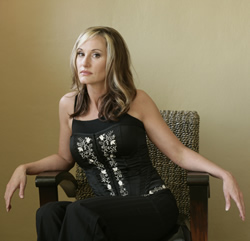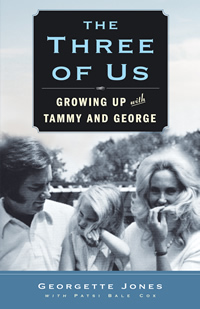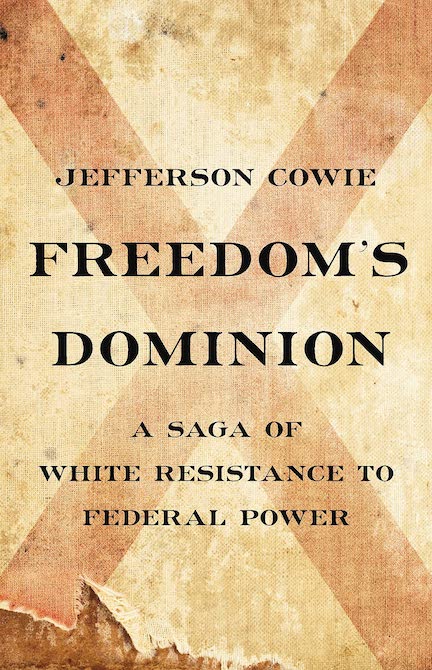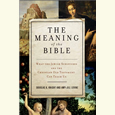Growing Up with the Joneses
In a new memoir, Georgette Jones writes about her relationship with her parents, George Jones and Tammy Wynette
Not many infants receive recording contracts from legendary producers on the day they’re born, but exceptions are made when the child in question is the only daughter of George Jones and Tammy Wynette, country music’s “First Couple.” In her new memoir, The Three of Us: Growing Up with Tammy and George, Georgette Jones offers an intimate portrait of her life with her storied parents and on her own.
Though the book spares no details of growing up as the only child of country-music royalty, it is very much a coming-of-age memoir. Jones is open about her parents’ troubles and their lives in the public eye, and she is equally candid about her own. She details her struggles with relationships, including her reconciliation with her father in the wake of her mother’s death. Jones worked as a nurse for many years, but she recently joined the family business and launched a country-music career. Her second album is due in July, and Chapter 16 recently caught up with her by phone before she begins touring again.
Chapter 16: When you were born, your parents were two of the biggest stars in country music, in the midst of building a country-music theme park in Florida. Although you were very young during that period of their career, what do you recall about the time in Florida?
Jones: I was only about two years old when we moved away from there, but I remember lots of stories about the park. We had a huge photo album from that period. It was something my dad wanted to do for many years, and eventually he opened another park in Texas years later. But that first park was an exciting time for my mom and dad. They were both doing well in their careers, and the music park was a way for them to spend more time at home with the family, not having to travel but still getting to perform. Really the park was an attempt to have more family time back then.
Chapter 16: So after the park in Florida, you moved to the house on Franklin Road in Nashville. What was it like growing up there? I understand there was no shortage of decorators?
 Jones: My dad, initially, was the decorator in the family. He was very good at it, and still is. Mom learned a lot from him and became quite the decorator herself. They both had a knack for it.
Jones: My dad, initially, was the decorator in the family. He was very good at it, and still is. Mom learned a lot from him and became quite the decorator herself. They both had a knack for it.
Chapter 16: Did they ever fight over who got to decorate certain rooms?
Jones: Ha! I think Mom pretty much let him pick whatever he wanted to do, and she’d take the leftovers. He mostly wanted to do living spaces and the bedroom.
Chapter 16: What were your birthday parties like?
Jones: I remember they were indoor/outdoor parties. We had a playground in the backyard of our house with a see-saw, a trampoline, and a swing. So we’d play outside some, then come in and have birthday cake. It was a pretty typical birthday party; Mom and Dad were both down-to-earth people and didn’t really see themselves as superstars, and thank goodness for that.
Chapter 16: You spent a lot of time growing up in the care of your maternal grandparents. Do you think they were consciously trying to keep you away from the business of celebrity?
Jones: Absolutely, and they did a pretty good job of it. Of course there were those times when you couldn’t help but hear about some things or see stories on the news. But they tried to keep us away from the dark side of celebrity. I mean, by the time you become a teenager, it is stressful enough.
Chapter 16: One of the most heartbreaking stories in the book is your story about singing “Daddy Come Home” with your father for an HBO special. Can you talk about that?
Jones: Bobby Braddock wrote a song for me and my dad called “Daddy Come Home,” and I was really excited about it. I was about ten years old, and when I listened to the words I remember really relating to it. I mean, honestly I wished he would come home. That’s what every kid dreams of when their parents break up. I remember getting nervous before going on stage, and I’d never really been nervous to sing before. But it was a big TV production, and I was going to sing it in front of a lot of people. But Dad was so sweet. He kissed me on the forehead and gave me a big hug. It made me more comfortable. I remember singing it and getting to that last line and wishing I could make it come true. But of course it didn’t work out that way.
Chapter 16: You spent a great deal of time on the road with Tammy Wynette. What was it like getting to know your mother on the road?
Jones: As a teenager, when I actually worked for my mom one summer as a backup singer, it was different [but] as a young child I didn’t realize how different Mom’s job was from other people’s. Her “office space” was just different concert venues. But Mom always made it really fun on the road. She was a kid at heart herself. If we were at a fair somewhere, she’d take [my half-siblings and me] to ride all the rides, and then she’d go get ready for the show. She always tried to involve all of us kids in whatever she could. When she went overseas, she would make special arrangements for us to go because she thought it would be a fun experience for us to get to see and do things she didn’t when she was growing up.
I really didn’t see her job any differently than others until I started working for her, and I realized at that point how difficult it was. I mean, as a child I just played cards, had fun, and enjoyed myself on the road. But when you’re working, there is so much preparation for the show, and it doesn’t matter if you feel bad or what’s wrong in your life, you still have to put the smile on and put on a great show for your crowd because that’s why you’re there.
Chapter 16: You write that coming of age, to you, meant seeing yourself as a separate entity from either of your parents.
 Jones: For a while, I thought the key was in music: I didn’t want to listen to country music; I wanted to listen to heavy metal. This tells you how old I am, but I had an eight-track of AC/DC. I loved KISS and anything that was completely the opposite of country music. But I always loved singing and writing, and as I got older and began trying to write songs, I found that what came from my heart was more country than anything else. And when I sing, I really pour my heart more into country music, especially ballads. I’m a sucker for a ballad. I guess eventually you come back full circle, which is kind of funny. My mom always said I would.
Jones: For a while, I thought the key was in music: I didn’t want to listen to country music; I wanted to listen to heavy metal. This tells you how old I am, but I had an eight-track of AC/DC. I loved KISS and anything that was completely the opposite of country music. But I always loved singing and writing, and as I got older and began trying to write songs, I found that what came from my heart was more country than anything else. And when I sing, I really pour my heart more into country music, especially ballads. I’m a sucker for a ballad. I guess eventually you come back full circle, which is kind of funny. My mom always said I would.
Chapter 16: For a number of reasons you talk about in the book, you didn’t really get to know your father until you were an adult.
Jones: Well, they divorced when I was four. A few times I got to spend some time with him on my own, but for the most part he would come to visit me at my mom’s house, or at my grandmother’s, maybe three or four times a year. When I was fourteen, though, I visited my dad in Texas, and started trying to have more of a relationship. It was just a difficult time for both of us. It’s no secret the troubles he’s had in the past. He tried to guard me from knowing any of that or being around any of that. I think he might’ve had a little guilt, too.
Being a teenager, I wanted to demand more of him. I wanted more and he wasn’t giving it, and I felt rejected and wanted to run away from him. I felt like I was being rejected. Neither one of us knew how to communicate our feelings. We were lost. When we had a falling-out when I got a divorce, and he didn’t speak to me on the phone for about a year and a half. But when my Mom passed away, he and [his wife] Nancy showed up at the house. I remember seeing him and thinking I couldn’t possibly face that right now; it’s too much. I started to walk away, and Nancy grabbed me by the arm and said, “Listen, your Daddy’s here for you and he’s hurting too. Go talk to him.” And I did, and the second he gave me a hug and told me he loved me, it all kind of melted away. The fact that he was there for me when I needed him the most, more than any other time, it meant a lot to me. And so we started trying to mend the relationship and spend more time together at that point. It all started to turn around there.
Chapter 16: Would you describe your relationship with your father now?
Jones: We’ve been through an awful lot. We get to see each other now. My children get to spend time with their grandfather. It’s much more of a family now than it’s ever been in the past. And that’s what it’s about. The bottom line is, the only thing you’re given that no one can take away from you is your family. The one thing I’ve learned from my relationship with my Dad and from losing my Mom [when I was] twenty-seven is that life is very short and you shouldn’t miss out on the important things in life because of petty differences, arguments, and things that don’t really matter. Family is the only thing that really helps us get through this life.
Chapter 16: You went to school and worked as a nurse for many years. Did a music career ever cross your mind then?
Jones: Music was always in the background for me. I’ve been writing poems and songs since I was a little girl. I sang occasionally, doing guest spots with a couple of bands and just singing for fun. But I didn’t pursue it for a long time for two reasons, really: one, I didn’t want to be away from my children the way that my parents were away from me growing up. I don’t hold it against them—that was their living and what they loved to do—but I didn’t want my kids to grow up and not be at home with them.
And growing up with them as my parents—you know, those are two sets of really big shoes to fill. As a young person, I was very concerned about being compared to them and not being able to live up to it. It took me until I was much older to realize it is human to be compared, and that’s going to happen no matter what. But I still love music so much, and I can’t imagine not having it in my life, in some degree, forever. I didn’t want to wait until I was too old to attempt a career and regret not ever trying. So I’m just not going to worry too much about what people think, but just do what I love to do. If someone likes it, that’s great. If not, I’m going to do it as long as I can for my own enjoyment. But hopefully, somebody likes it out there.
Chapter 16: Your mother had some insecurities about the music industry as well. She kept her beautician’s license for years, even when she had songs in the top ten.
Jones: She did. Everyone told her she was crazy to come to Nashville and try and be a singer. People told her how rare it was for someone to make it in this town and that she needed to have a real job and take care of her family. She was concerned about that but also determined enough and with enough belief in herself to give it a try. And luckily it did work out, but she had a big fear that maybe it wouldn’t last. She wanted to have a backup plan just in case. Eventually it became less of a backup plan and more of a statement of “That’s who I am. This is where I came from.”
Chapter 16: So you have one album out now, and a second on the way? With a tour planned, as well?
Jones: Yes, my second album comes out in July, and I do have a full band. We tour as much as we can, and we’re hoping to do some shows overseas. We’re going to Sweden in August
Chapter 16: Traditional country music is surprisingly popular in Europe, isn’t it?
Jones: It’s popular in lots of places in Europe, especially Ireland. But there’s also a large Canadian audience for traditional country, and then there’s a big market in Texas.
Chapter 16: So how would you describe your music? Traditional? Neo-traditional?
Jones: Well, these two albums were made for Heart of Texas Records, which is more of a traditional label, so I have some traditional Nashville-style songs, a couple of songs that are more Texas Swing, and then I’ve remade some of Mom and Dad’s songs. But I do have my own songs—which aren’t as modern as, say, Carrie Underwood, but fall somewhere in the middle of that and traditional country.
Chapter 16: In the book, you write that you disagree with some of the conclusions Jimmy McDonough draws in his recent biography of Tammy Wynette. Can you elaborate?
Jones: I never thought I would write this book; I had no interest in doing it for a long time. But I made it to about page ninety of McDonough’s book, and my fiancé Jamie realized how upset I was getting every time I would pick it up to try and read some more. He finally told me to just put it down if it was going to upset me that much. And he was right. The more I read, the more upset I got, because the picture he was painting of my mother was of someone very manipulative and hard-driven to the point where she was determined to step on anybody and use anyone to get to the top. And that’s not at all who my Mom was. Anyone in Nashville that knew her or worked with her will tell you that.
I don’t know exactly how he came to all those conclusions. I do know he talked to a lot of people who haven’t been around our family for many, many years. They didn’t really know Mom in Nashville, and I think they had their own ideas. But I wanted to write a book to show my mom as I knew her. People come up to me all the time to tell me stories about her, about how she helped them or took care of them. I wanted people to see that. I didn’t want people to read the last book and think terrible things about my mom. I wanted to put the truth out.
I tell you, since my Mom’s not here with me anymore; I only have memories to lean on. But when someone comes up to you—and you know they’re being genuine because they don’t have to tell you anything—and shares something special about how Mom touched their life in some way, it makes me feel good. I feel I get closer to Mom when I hear those stories.
Georgette Jones will discuss The Three of Us: Growing Up with Tammy and George at Barnes & Noble Booksellers in Brentwood on July 12 at 7 p.m.





